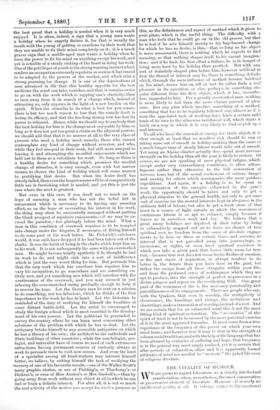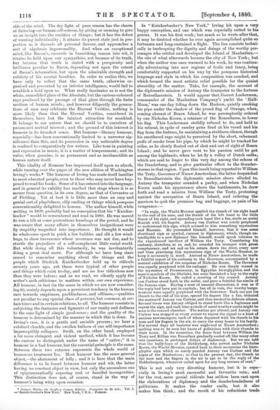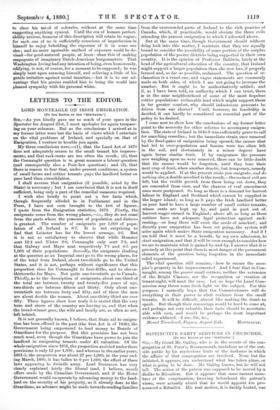THE VITALITY OF HUMOUR.
WE are prone to regard Literature as a strictly intellectual manifestation, when, nevertheless, the most conservative or preservative element of literature—Humour—is scarcely an intellectual q•tality at all. It belongs rather to the emotional
side of the mind. The dry light of pure reason has the charm of flattering our human self-esteem, by giving or seeming to give us an insight into the realities of things ; but it has the defect of wanting individuality ; it attains its purest state just in pro- portion as it discards all personal flavour, and approaches a sort of algebraic impersonality. And when an exceptional mind, like Bacon's, succeeds in burnishing reason into wit, it retains its hold upon our sympathies, not because of its truth, but because that truth is stated with a perspicuity and brilliance peculiar to Bacon, depending not upon the extent of Bacon's information, but upon the admirable strength and subtlety of his mental faculties. In order to realise this, we have only to reflect that the same truth, otherwise or- ganised and presented by an inferior intelligence, would fail to establish a hold upon us. What really fascinates us is not the white, unmodified glare of the Absolute, but the various-coloured rays produced by the passage of that glare through the finite medium of human minds ; and however diligently the genera- tions of men may celebrate the Eternal Verities, nothing is more likely than that the Eternal Verities, considered in themselves, have but the faintest attraction for mankind. It belongs to our nature that we should be to ourselves of paramount mutual interest ; and the ground of this interest is humour in its broadest sense. But humour—literary humour, especially—has been conventionally limited to a narrower sig- nificance than this, and its possession in any noticeable degree is confined to comparatively few writers. Like tone in painting and expression in music, it is a matter of temperament ; and its value, when genuine, is as permanent and as inexhaustible as human nature itself.
This vitality of Humour has impressed itself upon us afresh, while turning over the pages of the new edition of Washington Irving's works.* The humour of Irving has made itself familiar to most educated people, even to those who may never have hap- pened to read his books. Some of it has entered into the language, and in general its validity has reached that stage where it is as secure from question, in its own degree, as that of Cervantes or of Fielding. Yet at best it is little more than an easy and genial sort of playfulness, slily smiling at things which pompous conventionality delighted to honour. The author himself, while writing in 1809, probably had no conception that his " Knicker- bocker " would be remembered and read in 1880. He was moved to run a tilt at some pretentious humbugs of the period, and he was aware that many affairs in themselves insignificant were by stupidity magnified into importance. He thought it would be wholesome sport to prick a few bubbles and slit a few wind- bags, to show irreverence where reverence was not due, and to startle the prejudices of a self-complacent little social world. But while doing all this voluntarily, he was involuntarily doing a great deal more. For although we have long since ceased to remember anything about the things and the people which Diedrich Knickerbocker held up to ridicule seventy years ago, yet these were typical of other people and things which exist to-day, and are no less ridiculous now than they were before ; and as we read, we silently apply the writer's arch criticisms to matters within our own experience. All humour, in fact (in the sense in which we are now consider- ing it), mainly depends upon a persistent tendency in the human race towards emptiness, purblindness, and silliness,—qualities not peculiar to any special class of persons, but common, at cer- tain times and in certain relations, to all. The humour consists in subjecting the fantasies and figments of our vanity and dullness to the sane light of simple good-sense ; and the quality of the humour is determined by the manner in which this is done. In Irving's case, it is a gentle and amiable process ; we hear a subdued chuckle, and the swollen balloon of our self-importance imperceptibly collapses. Swift, on the other hand, employed a far more stringent and violent method, which it has become the custom to distinguish under the name of " satire ;" it is humour in a bad humour, but the essential principle is the same. Between these two extreme exponents the whole world of humorous treatment lies. Most humour has the same general object,—the abatement of folly ; and it is here that the main difference is to be found between humour and wit, the latter having uo constant object in view, but only the anomalous one of epigrammatically exposing real or fanciful incongruities. This distinction does not, of course, stand in the way of humour's being witty upon occasion.
• Irring's Works: the Gooffrty Crayon Edition. Complete in 26 vols. Vol. L ...-%$ntekerbocker's New York." Now York, U.S.A.: Putnam. In " Knickerbocker's New York," Irving bit upon a very, happy conception, and one which was especially suited to his genius. It was his first work ; but much as he wrote after that,
it may be doubted whether he ever again accomplished quite so fortunate and long-sustained a flight. The fun consists techni- cally in burlesquing the dignity and doings of the worthy per- sonages who settled and developed the Island of Manhattan,— the site of what afterwards became the city of New York ; but when the author was once warmed to his work, he was continu- ally adventuring into new regions of frolic and fancy, being comfortably supported on his way by the pompous historical language and style in which his composition was couched, and which formed the most artistic relief possible for the • quaint absurdity of the matter. Take, for example, the account of the diplomatic mission of Antony the trumpeter to the fortress of Rensellaerstein. It would appear that Govert Lockerman, commander of the Manhattan Company's yacht the Half- Moon,' was one day tiding down the Hudson, quietly smoking his pipe under the shadow of the proud flag of Orange, when, coming abreast of Beam Island, he was peremptorily ordered by one Nicholas Koorn, a retainer of the Rensellaers, to lower his flag. This Lockerman stolidly refused to do, and held. to his refusal, in spite of sundry guns fired at his vessel and his flag from the fortress, he maintaining a stubborn silence, though his smothered rage might be perceived by the short, vehement puffs of smoke from his pipe, by which he might be tracked for miles, as he slowly floated out of shot and out of sight of Beam Island ; and he never gave vent to his passion until he got
among the highlands, when he let fly a volley of Dutch oaths, which are said to linger to this very day among the echoes of.
the Dunderberg, and to give particular effect to the thunder- storms in that region. Upon this insult being reported to William the Testy, Governor of Nieuw Amsterdam, the latter despatched. to Rensellaerstein the diplomatic mission above alluded to. Antony the trumpeter sounded a parley, and when Nicholas: Koorn made his appearance above the battlements, be drew- forth and read a missive from William the Testy, protesting
against the usurpation of Beam Island, and ordering the: garrison to quit the premises bag and baggage, on pain of his vengeance :— " In reply, the Wacht-Meester applied the thumb of his right hand to the end of his nose, and the thumb of his left hand to the little finger of his right, and spreading each hand like a fan, made an aerial flourish with his fingers. Antony van Corlear was sorely perplexed to understand this sign, which seemed to him something mysterious and Masonic,. He persuaded himself, however, that it was some shorthand sign or symbol, current in diplomacy, which, though un- intelligible to a new diplomat like himself, would speak volumes to the experienced intellect of William the Testy. Considering his embassy, therefore, at an end, he sounded his trumpet with great complacency, and set sail on his return down the river, every now and then practising this mysterious sign of the Wacht-Meester, to keep it accurately in mind. Arrived at Nieuw Amsterdam, be made a faithful report of his embassy to the Governor, accompanied by a manual exhibition of the response of Nicholas Koorn. The Governor was equally perplexed with his embassy. He was deeply versed in the mysteries of Freemasonry, in Egyptian hieroglyphics, and the mystic symbols of the Obelisks, but none furnished a key to the reply of Nicholas Koorn. He called a meeting of the council. Antony van Corlear stood forth in the midst, and gave a faithful facsimile of the famous sign. Having a nose of unusual dimensions, it was as if the reply had been put in capitals; but all in vain, the worthy burgo- masters were equally perplexed with the Governor. Each one put his thumb to the end of his nose, spread his fingers like a fan, imitated the motion of Antony van Corlear, and then smoked in dubious silence. Several times was Antony obliged to stand forth like a fugleman and repeat the sign, and each time a circle of nasal weather-cocks might be seen in the council-chamber. The matter got abroad, and Antony van Corlear was stopped at every corner to repeat the signal to a knot of anxious newsmongers, each of whom departed with his thumb to his nose and his fingers in the air, to carry the story home to his family. For several days all busintss was neglected at Nienw Amsterdam ; nothing was to be seen but knots of politicians with their thumbs to their noses. In the meantime, the fierce fend between William the Testy and Killian van Rensellaer gradually cooled off, like many other war questions, in prolonged delays of diplomacy. But we are told that the bully-boys of the Helderberg, who served under Nicholas Koorn, the Wacht-Meester, carried back to their mountains the hiero- glyphic sign which so sorely puzzled Antony van Corlear and the sages of the Manhattoes; so that to the present day, the thumb to the nose and the fingers in the air is apt to be the reply of the Helderbergers, whenever called upon for any long arrears of rent."
This is not only very diverting humour, but it is espe-•
cially in Irving's most successful and favourite vein; and for the rest, more genial ridicule has seldom been cast upon the elaborations of diplomacy and the dunderheadedness of politicians. It makes the reader smile, but it also
makes him think ; and the result of his reflections tends- to clear his mind of cobwebs, without at the same time azggesting anything cynical. Until the era of human perfect- _ ability arrives, humour of this description will retain its vogue ; for each one of us is sufficiently conscious of imperfection in himself to enjoy beholding the exposure of it in some one else ; and no more agreeable method of exposure could be de- vised—for good-natured people, at least—than this of making scapegoats of imaginary Dutch-American burgomasters. That Washington Irving had any intention of being, even humorously, edifying, is not, of course, for a moment to be supposed ; he was simply bent upon amusing himself, and relieving a little of his gentle irritation against social inanities,—but it is to our ad- vantage that his genius enabled him to bring the world into pleased sympathy with his personal whim.




































 Previous page
Previous page